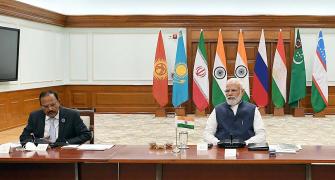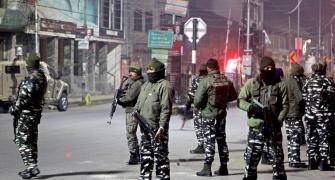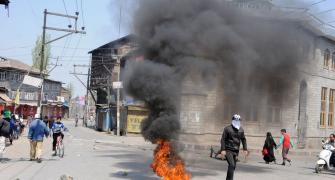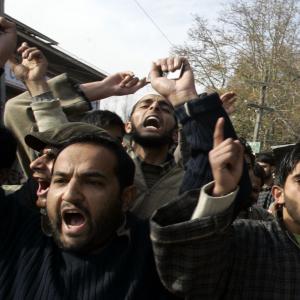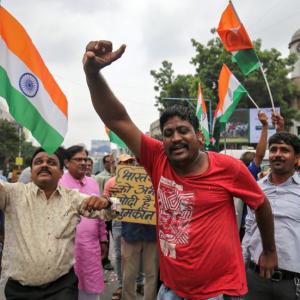'They are worried that the BJP government is trying to reduce Kashmiris as a minority.'

Amarjit Singh Dulat, former head of the country's external intelligence agency, the Research and Analysis Wing (R&AW), is a spymaster known for his in-depth knowledge about Kashmir, so much so that post retirement, then prime minister Atal Bihari Vajpayee appointed him as his advisor on Kashmir.
Dulat was born in Sialkot, now in Pakistan, and his jurist father Justice Shamsher Singh rose to become a high court judge. Educated at Shimla, Delhi and Chandigarh, he joined the Indian Police Service in 1965.
Dulat served in the Intelligence Bureau for 30 years. At the Bureau, he headed the Kashmir group during the turbulent 1990s. He knew Kashmir, its people and its politicians so intimately that he was referred as 'Mr Kashmir'.
After his tenure at RA&W, he was appointed adviser on Kashmir in prime minister Vajpayee's office and served there from January 2001 to May 2004.
After he retired from government, the spymaster has written a series of books: Kashmir: The Vajpayee Years (2014), The Spy Chronicles: R&AW, ISI and the Illusion of Peace (2018).
Dulat was at the Jaipur Literature Festival recently to promote his memoir A Life In the Shadows where Rediff.com's Senior Contributor Prakash Bhandari spoke to him.
Part one of a two-part interview:
What inspired you to write A Life In The Shadows?
The idea to write another book came during the pandemic when I was confined to the four walls of my house.
I had enough material backed with some authentic documents.
I thought the book would deal with my life -- both personal and official -- where I could narrate my own and my family's life like meeting the love of my life Paran, my wife, and my memories of Partition as a child.
I decided to write about the persons who I met in my life and my experience with them.
It's not exactly an autobiography, but the book chronicles my life as an intelligence person where I tried to explain what exactly espionage means.
I would do some plain speaking and would say doing espionage for the country is patriotism, but in reality this would only be a shroud for villainy and skullduggery.

What is your perception of mass surveillance?
Mass surveillance is surveillance or monitoring the population.
Mass surveillance is done by the government agency under the law and is necessarily done to fight terrorism, prevent crime and above all protect national interest.
But each country has its own laws relating to mass surveillance.
In India, it is done as routine, but the stress is on preventing crime and national security as paramount.
How would you describe counter-intelligence?
It is nothing but protecting one's intelligence programme from an opposition's intelligence service and done basically to prevent espionage, sabotage etc.
I spent most of my career in counter-intelligence and going by my experience I could say counter-intelligence has no defined rules.
There are no dos and don'ts. Nothing is above the board in the world of spookdom. There is not much ethics involved.

You have written in the new book that rascality plays a key role in intelligence.
Let's make it simple. Rascality in the Indian context is 'Haramis'. They are the intelligence persons who are double agents and they are often successful in gathering intelligence.
But India hardly used double agents for intelligence gathering because we never trusted Pakistani intelligence persons.
The CIA did use theb Pakistani intelligence network in killing Osama bin Laden. This could be termed rascality or Haramis.

What about the abrogation of Article 370 by the BJP government?
The BJP government only completed a process through abrogation of Article 370.
Prior to the abrogation of Article 370, Kashmir was called a 'constituent unit' of the Indian Union.
A number of provisions of Article 370 was diluted through the Indira-Sheikh Accord signed in 1975 between Sheikh Abdullah and then prime minister Indira Gandhi. It decided the terms under which Abdullah would re-enter the politics of Kashmir.
It allowed Abdullah to become the chief minister of Jammu and Kashmir again after 22 years and enabled competitive politics in the state.
The Accord only granted the state government the right to review the laws which were specifically from the Concurrent list extended after 1953.
Only these laws could be considered for amendment or for repealing purposes.
The agreement restated the conditions of Jammu and Kashmir's incorporation into India in 1953 with a clause that the state's administration would be maintained under Article 370.
I think there was no need for the abrogation of 370.
The abrogation of 370 deprives the Kashmiris of their dignity. It's an emotional issue.
Kashmiriyat is an integral part of the Kashmiris and any effort to deprive it would always hurt.
The Union government has been trying to mainstream Kashmir and get Pakistan out of the Kashmiris' mind and the Indian government with its muscular power has been able to achieve its objectives.
What do you think of the Delimitation process in Kashmir?
It has been done to put the people of Kashmir as a minority and it hangs over the Kashmiri as a shadow.

What do the Kashmiris want?
Kashmiris do not want any freedom, they would never like to be a part of Pakistan also.
They are worried that the BJP government is trying to reduce the Kashmiris as a minority.
They fear that the BJP government would rob them of 'Kashmiriyat'.
Feature Presentation: Aslam Hunani/Rediff.com

